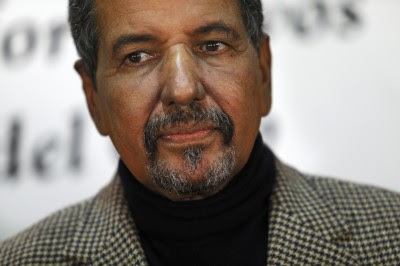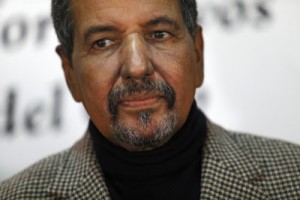The Washington Post
FILE – This Thursday, Nov. 12, 2015 file photo shows Polisario Front’s Secretary General Mohamed Abdelaziz listening to a question during a news conference in Madrid, Spain. The head of the independence movement in the Western Sahara, Mohamed Abdelaziz, has died after a long illness, the Polisario Front said in a statement.
(Francisco Seco, File/Associated Press)
By Aomar Ouali and Elaine Ganley | AP Africa May 31
ALGIERS, Algeria — Mohamed Abdelaziz, the head and co-founder of the Polisario Front independence movement in the Western Sahara, died Tuesday after a long illness, the group said. He was in his late 60s.
The Polisario Front ordered a 40-day mourning period, after which it said a new secretary-general will be chosen.
Algerian President Abdelaziz Bouteflika also declared a week of mourning for the Polisario leader, whose group is based in Tindouf, in southern Algeria.
The death of Abdelaziz, leader of the Polisario Front for four decades, comes at a time of growing tensions over the fate of the Western Sahara. The Polisario Front has fought for four decades for independence for the vast, mineral-rich territory on Africa’s Atlantic coast, which was annexed by Morocco after Spain withdrew in 1975.
Morocco now considers the territory its “southern provinces” and has pumped funds into the area’s development over the years. Morocco is also becoming increasingly assertive on the topic with the United Nations, which has worked for years to help settle the issue of Western Sahara’s status.
Abdelaziz was born in 1948 in Smara, which is now in Moroccan-controlled Western Sahara, and led the Polisario Front, which he helped found, since 1976, according to Algeria’s state-run APS news agency.
The issue of Western Sahara has prompted new friction between two North African neighbors, Morocco and Algeria. Algeria supports the Polisario Front, and like numerous other African countries recognizes the Saharawi Arab Democratic Republic it defends.
The Moroccan government has proposed wide-ranging autonomy for the region, but the Polisario Front insists on self-determination through a referendum for the local population — as called for in U.N. resolutions.
Morocco expelled most U.N. civilian staff in April after U.N. Secretary-General Ban Ki-moon used the word “occupation” to refer to the situation following a visit to a camp for Western Sahara refugees in southern Algeria.
In April, a top member of the Polisario Front, Bachir Mustafa Sayed, warned that war is possible over the disputed territory if the U.N. Security Council fails to set a timetable for a vote on self-determination.
Abdelaziz warned in a letter to the U.N. secretary-general that Morocco will have “a green light to a military aggression” unless the Security Council imposes “real and direct pressure” on Morocco to restore the U.N. mission’s work. He warned that the Saharawi people in Western Sahara will defend their rights in the face of aggression “by all legitimate means, including armed struggle.”
The Polisario had mounted a desert war against Morocco after the territory was annexed.
Issandr El Amrani, North Africa Project Director with the International Crisis Group, said the impact of Abdelaziz’ death on the U.N. contingent was unclear in the immediate future “but it adds uncertainty at a time when the mission is under pressure.”
El Amrani noted the saber-rattling tone among some Polisario activists in the absence of a diplomatic breakthrough.
“The next Polisario leader will have to contend with that sentiment,” El Amrani said.
The Polisario Front has appointed the head of the movement’s National Council, Khatri Adduh, as interim Polisario leader.
In the refugee camps of Tindouf, Saharawi blogger Mohamedsalem Werad described the overall atmosphere on Tuesday as quiet, sad and uncertain. “Many people are expecting all kinds of scenarios,” he said.








